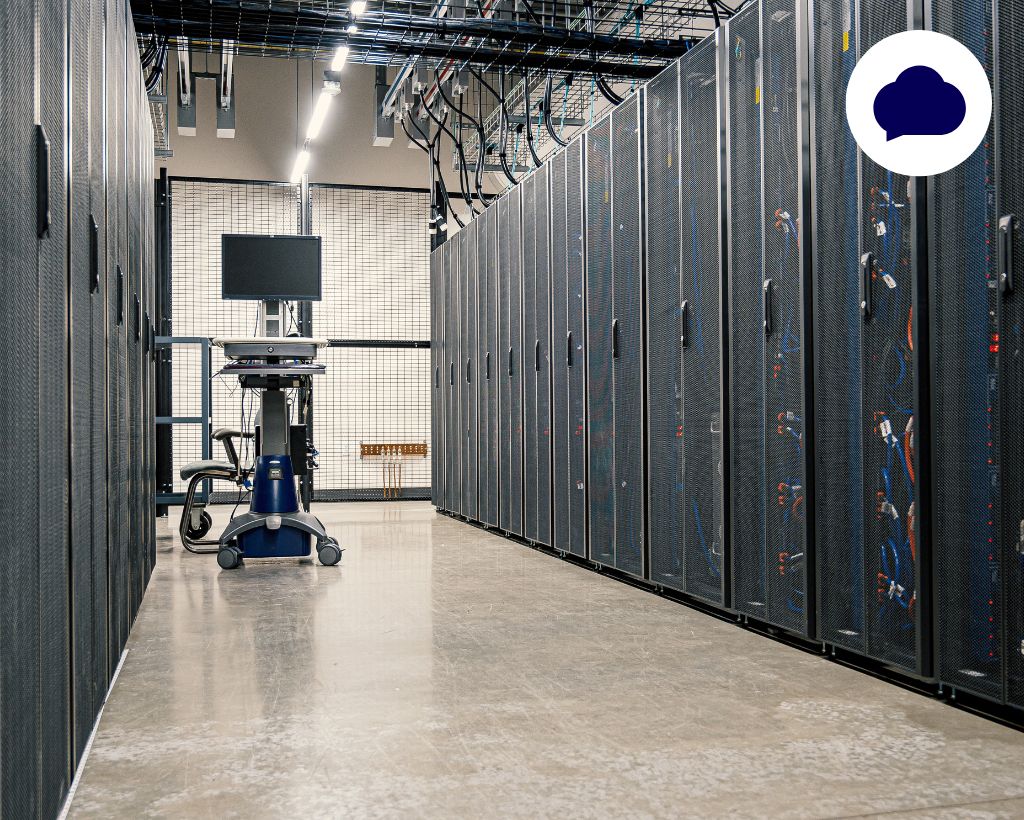
In the era of digital transformation, data is the most valuable asset for businesses. Advanced infrastructures are required to ensure that this data is processed, stored, and accessed securely, quickly, and without interruption. At this point, data centers form the backbone of the modern IT ecosystem. In this article, we will discuss various technical and strategic details of data centers, from their definitions to their architecture, energy efficiency to cloud integration.
What is a Data Center?
A data center is a physical facility used by companies, institutions, or service providers to store, process, and manage digital data. Thousands of servers and network equipment in these facilities work in an integrated manner with specially designed security, climate control, and energy systems.
Data centers are not just spaces for hosting hardware; they are strategic infrastructures that support many critical functions such as business continuity, disaster recovery, network management, and cybersecurity.
Technical Architecture of the Data Center
For a data center to be efficient and sustainable, the following technical components must work in harmony:
1. Server Racks and Blade Systems
High-density blade servers, which occupy less space compared to traditional servers, are preferred today to increase the efficiency of data centers.
2. Virtualization Layer
Hypervisors (e.g., VMware ESXi, Proxmox, KVM) allow multiple virtual servers to run on physical hardware. This means a more flexible and scalable infrastructure.
3. Load Balancers
Load balancers distribute the load of web applications and services across different servers, ensuring performance and availability.
4. Cabinets and Cooling Channels
Hot and cold aisle containment systems work in an integrated manner with the climate control system. This not only extends the lifespan of the hardware but also optimizes energy consumption.
5. Advanced Network Infrastructure
Switches configured with connection speeds of 10 Gbps, 40 Gbps, and above ensure uninterrupted data transfer with fiber optic cabling and redundant connections.
Energy Management and Sustainability
Data centers account for approximately 1.5% of the world's total electricity consumption. Therefore, energy efficiency is a critical factor. The following practices reduce the environmental impact of data centers:
• PUE (Power Usage Effectiveness) Ratio: Low PUE values such as 1.1 indicate energy efficiency.
• Use of Renewable Energy: It is now possible to operate data centers with energy obtained from sources such as solar and wind.
• Free Cooling Systems: Using outside air directly for cooling significantly reduces energy consumption.
Disaster Recovery and Redundancy
A data center must not only be operational but also capable of protecting data in the event of a disaster. In this context:
• Geographical Redundancy: Setting up backup data centers in different cities or countries distributes risk.
• Snapshot and Backup Solutions: Automated data backups ensure that the system can be quickly restored.
• BGP Routing and Anycast DNS: These are network solutions that prevent system crashes by directing traffic to alternative paths.
Usage Areas and Sectoral Applications
Data centers are critical not only for technology companies but also for a wide range of sectors:
• Finance: Real-time transaction analysis, algorithmic trading, and protecting customer data.
• Healthcare: Storing electronic health records, processing medical imaging data.
• Education: Hosting distance education platforms.
• Logistics and Transportation: Real-time location tracking, routing algorithms, and fleet management systems.
• Gaming and Media: Broadcasting that requires high bandwidth and low-latency gaming infrastructure.
PlusClouds: Assurance of Modern Data Center Technology
PlusClouds adopts high standards in data center solutions, providing customers with end-to-end digital infrastructure. Some of the main services offered by PlusClouds are:
• Server solutions
• Backup and disaster recovery systems
• Corporate cloud transition support
• Software-defined data center (SDDC) infrastructure
• 24/7 monitoring, automation, and support services
PlusClouds and Leo: Next Generation Data Center Management
Data centers have evolved beyond just being physical locations. With technological advancements, management processes have become easier.
The Leo system developed by PlusClouds allows data centers to be managed remotely and autonomously. This means you can even monitor a data center from home and track operations.
With Leo:
• Servers are easily set up and managed,
• Failures are automatically detected,
• Everything is controlled through a single interface.
• For more information: Leo
Meet PlusClouds with customized solutions tailored to your needs to establish a solid foundation for your digital infrastructure.
The Future Data Center: Edge and Artificial Intelligence Integration
The future of data centers highlights the following concepts:
Edge Computing: Micro data centers are gaining popularity due to the need to process data closer to where it is generated.
Monitoring with Artificial Intelligence: Parameters such as energy consumption, cooling efficiency, and system health are optimized with AI-supported systems.
Automation: Server management is now done with significantly less human intervention using orchestration tools like Kubernetes.
Frequently Asked Questions (FAQ)
1. Is it more sensible to build a data center or to rent one?
Building a data center is a costly and complex process for small and medium-sized enterprises. Therefore, renting (colocation or cloud services) is a more economical and manageable solution.
2. What happens if the internet goes down at the data center?
Professional data centers use redundant internet lines. Additionally, BGP routing allows for instantaneous switching between different providers.
3. Why are certifications like ISO 27001 important?
Standards such as ISO 27001 and ISO 22301, which document data security and business continuity, demonstrate the reliability and compliance of the data center.
4. Will I still need an IT team when using data center services?
Yes, but the need will change significantly. When managed services are utilized, system management is carried out by the provider, which allows the in-house IT team to focus on more strategic tasks.
Conclusion
Data centers form the data backbone of the modern world. Almost every digital service we use in our daily lives is supported by a data center in the background. Whether you are in e-commerce, finance, or healthcare; a reliable data center infrastructure is vital for the sustainability of your business.
Working with local providers like PlusClouds that are experts in their field gives you an edge in terms of technical superiority and legal compliance. You can start exploring the solutions offered by PlusClouds to confidently grow your digital infrastructure.





